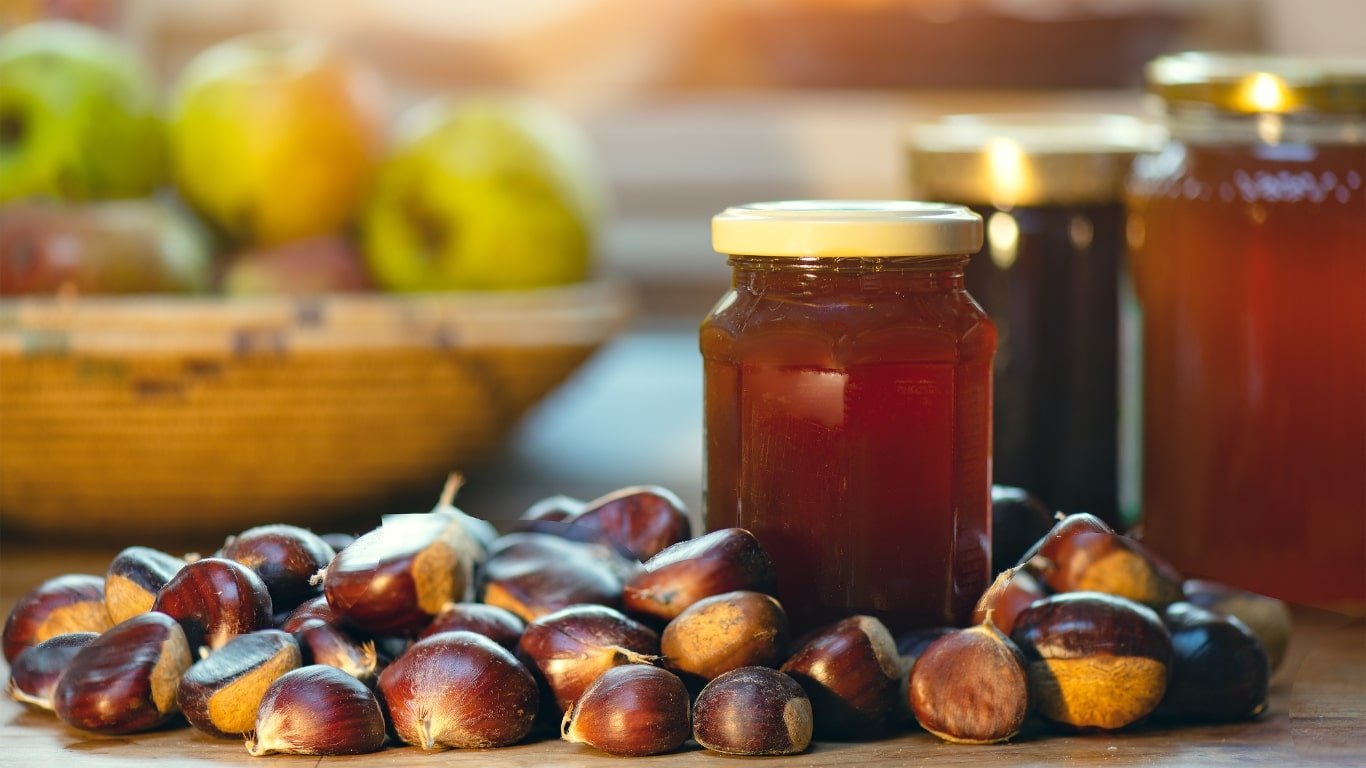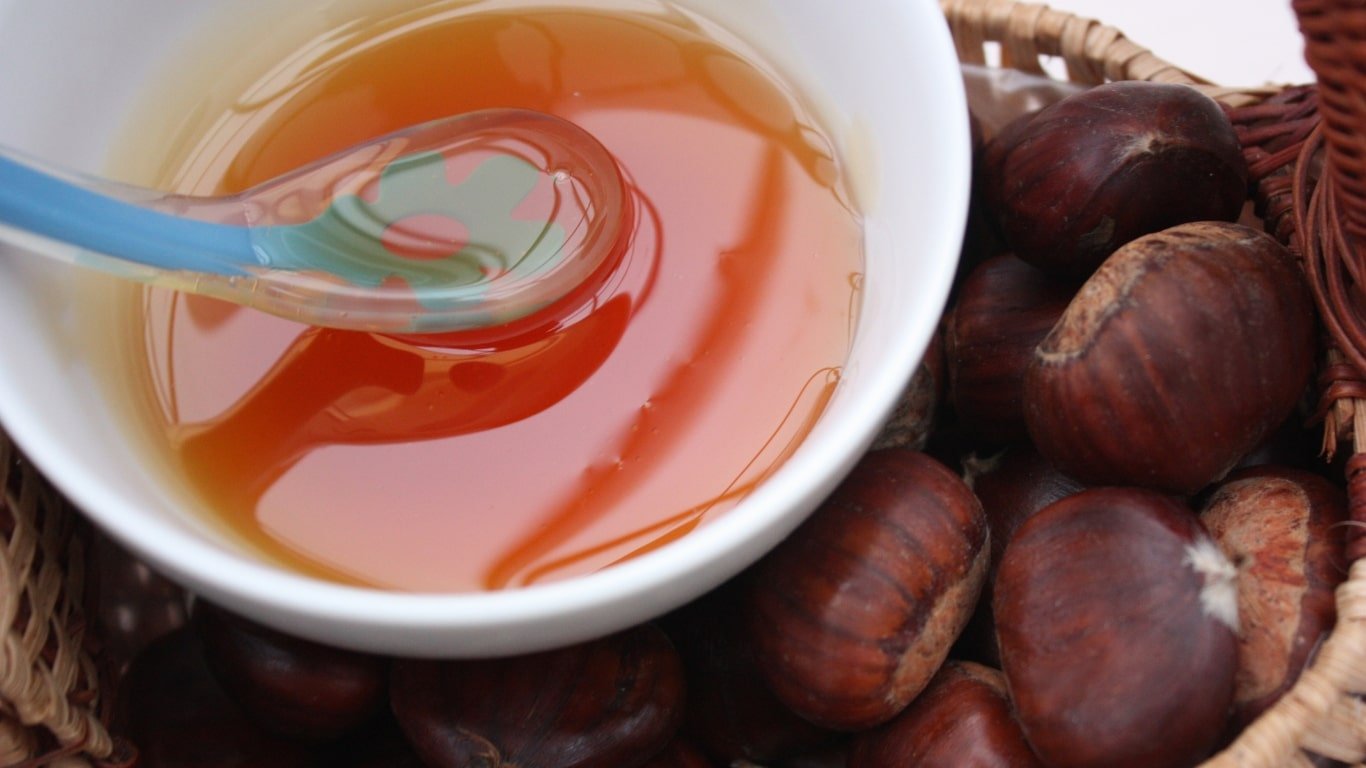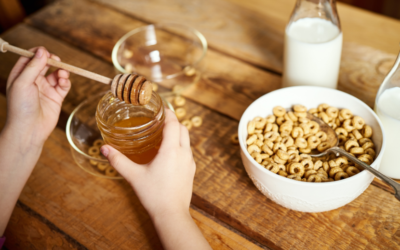
Introduction
Honey, the natural sweetener produced by bees, comes in numerous varieties, each with its distinct flavor, color, and potential health benefits. Among these, chestnut honey stands out for its rich, robust flavor and its unique nutritional properties. This in-depth exploration delves into the origins of chestnut honey, its distinctive characteristics, culinary uses, and health benefits, offering a comprehensive look at why this particular honey is revered by many.
Origins and Production of Chestnut Honey
Chestnut honey is derived from the nectar of chestnut trees, particularly those belonging to the genus Castanea. These trees are native to temperate regions of the Northern Hemisphere, including parts of Europe, Asia, and North America. The chestnut tree is known for its large, serrated leaves and its edible nuts, which have been a staple food in many cultures for centuries.
The production of chestnut honey involves placing beehives near chestnut groves during the blooming season, typically in late spring to early summer. As the chestnut trees flower, bees forage for nectar from the blossoms, which they then carry back to the hive. Inside the hive, the nectar is processed and transformed into honey through enzymatic action and evaporation.
Chestnut Honey Characteristics and Flavor Profile
Chestnut honey is known for its distinctive dark color, which ranges from amber to deep brown. Its rich, full-bodied flavor sets it apart from lighter, milder honey varieties. The taste is often described as robust and slightly bitter, with a complex profile that can include earthy, nutty, and woody notes. The bitterness is due to the high concentration of chestnut tree nectar and the presence of phenolic compounds, which contribute to its unique flavor.
The aroma of chestnut honey is equally distinctive, with a strong, lingering scent that can evoke the forest. This characteristic aroma, combined with its bold flavor, makes chestnut honey a favorite among those who appreciate more intense honey varieties.
Culinary Uses of Chestnut Honey

Chestnut honey’s unique flavor and aroma make it a versatile ingredient in the culinary world. Its bold taste can enhance a wide range of dishes, both sweet and savory. Here are some popular uses:
- Baking: Chestnut honey can be used as a substitute for other sweeteners in baking. Its rich flavor pairs well with whole grain and nut-based recipes, such as breads, muffins, and cakes. It adds a depth of flavor that complements chocolate, coffee, and spice.
- Glazes and Marinades: Its robust taste makes chestnut honey an excellent choice for glazes and marinades. It can be used to create a flavorful coating for roasted meats like pork, chicken, or lamb. The honey’s strong flavor can balance out the savory and tangy notes in marinades.
- Cheese Pairings: Chestnut honey pairs beautifully with strong, aged cheeses. Its bold flavor complements cheeses like blue cheese, aged Gouda, or sharp cheddar, creating a balanced and sophisticated flavor profile on cheese platters.
- Dressings and Sauces: Use chestnut honey to add complexity to salad dressings and sauces. It can be incorporated into vinaigrettes, barbecue sauces, or glazes, offering a unique twist on traditional recipes.
- Sweet Treats: Drizzle chestnut honey over yogurt, pancakes, or ice cream to enhance their flavor. Its strong taste can stand up to rich desserts and provide an interesting contrast to sweeter elements.
Health Benefits of Chestnut Honey
Chestnut honey is not only valued for its flavor but also for its potential health benefits. Here are some of the ways it may contribute to overall well-being:
- Antioxidant Properties: Chestnut honey is rich in antioxidants, including phenolic compounds and flavonoids. These antioxidants help neutralize free radicals in the body, which can reduce oxidative stress and inflammation. Regular consumption of antioxidant-rich foods is associated with a lower risk of chronic diseases and improved overall health.
- Anti-Inflammatory Effects: The phenolic compounds in chestnut honey have anti-inflammatory properties, which can help reduce inflammation in the body. This may be beneficial for conditions such as arthritis or other inflammatory disorders.
- Antibacterial and Antimicrobial Properties: Like many types of honey, chestnut honey possesses natural antibacterial and antimicrobial properties. These attributes can help combat infections and support immune health. The honey’s high acidity and hydrogen peroxide content contribute to its ability to inhibit bacterial growth.
- Digestive Health: Chestnut honey can aid in digestive health by promoting the growth of beneficial gut bacteria. Its prebiotic properties support a healthy gut microbiome, which is essential for proper digestion and overall gut function.
- Wound Healing: The antimicrobial and anti-inflammatory properties of chestnut honey make it useful for topical applications. It can be applied to minor cuts, burns, or wounds to help prevent infection and promote healing.
Checking Chestnut Honey Quality and Authenticity
To ensure you’re getting high-quality chestnut honey, it’s important to purchase from reputable sources. Look for honey that is labeled as pure and raw, as this indicates minimal processing and retains the natural enzymes and nutrients. Authentic chestnut honey should have a dark, rich color and a strong, distinctive flavor.
Be aware of potential adulteration, where honey is mixed with other sweeteners or diluted. Genuine chestnut honey will have a consistent flavor and aroma that reflects its origin.
Frequently Asked Questions
What is special about chestnut honey?
Chestnut honey is special due to its distinctively rich, robust flavor and dark color, which set it apart from other honey varieties. Its complex taste often includes earthy, nutty, and slightly bitter notes, making it a unique addition to culinary creations. Additionally, chestnut honey is renowned for its high antioxidant content and potential health benefits, including anti-inflammatory and antibacterial properties. Its bold flavor profile and potential health advantages make it a sought-after choice for both gourmet cooking and natural remedies.
What to do with chestnut honey?
Chestnut honey can be used in a variety of culinary and health-related applications. Its robust flavor makes it an excellent choice for enhancing baked goods, such as bread and cakes, or for adding depth to glazes and marinades for meats. It pairs well with strong cheeses and can be drizzled over yogurt, pancakes, or ice cream for a unique twist. Additionally, its potential health benefits, including antioxidant and antibacterial properties, make it a valuable natural remedy for soothing sore throats and supporting overall well-being.
What are the nutrients in chestnut honey?
Chestnut honey is rich in several beneficial nutrients, including antioxidants like phenolic compounds and flavonoids, which help combat oxidative stress and inflammation. It also contains essential minerals such as potassium, calcium, magnesium, and iron, which support various bodily functions. Additionally, chestnut honey provides trace amounts of vitamins, including vitamin C and B vitamins, contributing to overall health. Its natural sugars, primarily fructose and glucose, offer a source of energy while enhancing its sweetness.
Does chestnut honey expire?
Chestnut honey, like most types of honey, has a remarkably long shelf life and does not expire in the traditional sense. Due to its low water content and acidic pH, honey is naturally resistant to bacterial growth and spoilage. However, over time, it may undergo changes such as crystallization or a slight alteration in flavor. Properly stored in a cool, dry place in a sealed container, chestnut honey can remain safe and high-quality for many years. Crystallized honey can be re-liquefied by gently warming it in a water bath.
Is chestnut honey a superfood?
Chestnut honey is often considered a superfood due to its rich nutritional profile and potential health benefits. It is packed with antioxidants like phenolic compounds and flavonoids, which help combat oxidative stress and inflammation. Additionally, chestnut honey contains essential minerals, such as potassium and magnesium, and has antibacterial and anti-inflammatory properties. While it may not have the same level of recognition as some other superfoods, its combination of nutrients and health benefits makes it a valuable addition to a balanced diet.
Conclusion
Chestnut honey is a remarkable honey variety with a rich, robust flavor and a range of potential health benefits. Its unique taste and aroma make it a versatile ingredient in both sweet and savory dishes, while its antioxidant, anti-inflammatory, and antimicrobial properties contribute to overall well-being. By understanding its origins, characteristics, and uses, you can fully appreciate the value of chestnut honey and enjoy its diverse applications in your culinary and health practices. Whether you’re a honey enthusiast or a newcomer to this distinctive variety, chestnut honey offers a flavorful and beneficial addition to your pantry.



